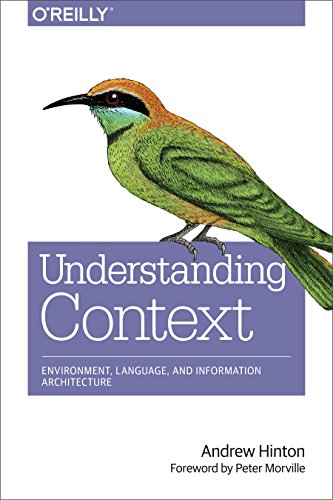

Most ebook files are in PDF format, so you can easily read them using various software such as Foxit Reader or directly on the Google Chrome browser.
Some ebook files are released by publishers in other formats such as .awz, .mobi, .epub, .fb2, etc. You may need to install specific software to read these formats on mobile/PC, such as Calibre.
Please read the tutorial at this link. https://ebooknice.com/page/post?id=faq
We offer FREE conversion to the popular formats you request; however, this may take some time. Therefore, right after payment, please email us, and we will try to provide the service as quickly as possible.
For some exceptional file formats or broken links (if any), please refrain from opening any disputes. Instead, email us first, and we will try to assist within a maximum of 6 hours.
EbookNice Team

Status:
Available4.6
39 reviews
ISBN 10: 1449323170
ISBN 13: 9781449323172
Author: Andrew Hinton
To make sense of the world, we’re always trying to place things in context, whether our environment is physical, cultural, or something else altogether. Now that we live among digital, always-networked products, apps, and places, context is more complicated than ever―starting with "where" and "who" we are.
This practical, insightful book provides a powerful toolset to help information architects, UX professionals, and web and app designers understand and solve the many challenges of contextual ambiguity in the products and services they create. You’ll discover not only how to design for a given context, but also how design participates in making context.
Learn how people perceive context when touching and navigating digital environments
See how labels, relationships, and rules work as building blocks for context
Find out how to make better sense of cross-channel, multi-device products or services
Discover how language creates infrastructure in organizations, software, and the Internet of Things
Learn models for figuring out the contextual angles of any user experience
Preface and Introduction
1. Praise for Understanding Context
2. Foreword
3. Preface
4. The Practical Bit
5. Who Should Read This Book?
6. So This Book Teaches Methods for Designing Context?
7. Why Information Architecture?
8. What Will You Learn from This Book?
9. A Tour Through the Book’s Six Parts
10. The Personal Bit
11. Acknowledgments
Part I: The Context Problem
12. Chapter 1: Everything, Yet Something
13. Chapter 2: A Growing Challenge
14. Chapter 3: Environments, Elements, and Information
15. Chapter 4: Perception, Cognition, and Affordance
16. Chapter 5: Attention, Control, and Learning
17. Chapter 6: The Elements of the Environment
18. Chapter 7: What Humans Make
Part II: Semantic Information
19. Chapter 8: How Language Works
20. Chapter 9: Language as Infrastructure
21. Chapter 10: The Written Word
22. Chapter 11: Making Things Make Sense
Part III: Digital Information
23. Chapter 12: Digital Cognition and Agency
24. Chapter 13: Digital Interaction
25. Chapter 14: Digital Environment
Part IV: The Maps We Live In
26. Chapter 15: Information as Architecture
27. Chapter 16: Mapping and Placemaking
28. Chapter 17: Virtual and Ambient Places
29. Chapter 18: The Social Map
Part V: Composing Context
30. Chapter 19: Arrangement and Substance
31. Chapter 20: The Materials of Semantic Function
32. Chapter 21: Narratives and Situations
33. Chapter 22: Models and Making
Final Section
34. Coda
35. About the Author
36. Understanding Context
ai understanding context
why is understanding context important
why understanding context in research is important pdf
why is understanding context important for writing
not.understanding the context
Tags: Andrew Hinton, Understanding Context